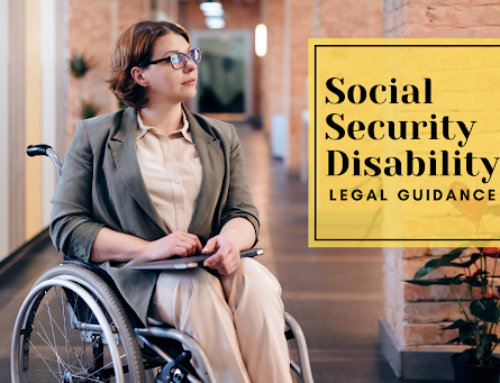
Representation at SSDI hearings is crucial for ensuring individuals receive the benefits they deserve. A disability lawyer specializes in navigating the complexities of SSDI cases and advocating for clients’ rights.
When facing an SSDI hearing, many individuals wonder if they should enlist the help of a disability lawyer. The legal professional, also known as the lawyer for SSDI, specializes in representing clients during SSDI hearings and can provide invaluable support and guidance throughout the process.
Let’s explore whether a lawyer for SSDI can stand for you and how they can assist in navigating the SSDI hearing process.
Understanding the Role of a Lawyer at SSDI Hearings
Legal hearings where people ask for their SSDI benefits back. During these hearings, claimants present evidence and testimony to an administrative law judge who will review their case.
Discussion of the Role of a Disability lawyer in representing SSDI Claimants at Hearings
A Social Security disability lawyer holds a great role in representing SSDI claimants at hearings. They know the SSDI rules well and work well for the client.
A lawyer for SSDI
- Gathers relevant medical evidence
- Prepares legal arguments
- Cross-examines witnesses during hearings
- Strengthen their clients’ cases
Benefits of Having Legal Representation at SSDI Hearings
Legal representation at SSDI hearings offers numerous advantages for claimants seeking disability benefits from federal district court.
Expertise in Disability Law:
Disability lawyers are well-versed in SSDI laws and regulations. They ensure that claimants’ cases are presented effectively and with legal requirements.
Guidance and Support:
A lawyer for SSDI provides invaluable guidance and support throughout the SSDI hearing process. They help claimants navigate complex legal procedures and understand their rights.
Gathering Evidence:
Disability lawyers assist in gathering relevant medical evidence and documentation to support claimants’ cases.
Preparation and Presentation:
A disability attorney prepares persuasive legal arguments and presentations for SSDI hearings. They effectively advocate for claimants’ rights and interests.
Cross-Examination:
Legal representation allows for effective cross-examination of witnesses and experts during SSDI hearings. Social Security disability lawyers challenge unfavorable testimony and strengthen claimants’ cases.
Increased Chance of Success:
With the expertise and support of a disability lawyer, claimants have a higher chance of success at SSDI hearings.
Qualifications and Expertise of Lawyers for SSDI Hearings
Qualifications and Credentials to Look for in a Lawyer for SSDI Hearings
When searching for a disability lawyer to represent you at SSDI hearings, consider their qualifications and credentials carefully.
Legal Expertise:
Ensure that the lawyer specializes in disability law and has extensive experience handling SSDI cases. Look for a lawyer for SSDI who is part of a good legal group and has earned praise for know-how in this field.
Additionally, consider whether the lawyer is accredited by the National Organization of Social Security Claimants’ Representatives (NOSSCR), which signifies their expertise in SSDI cases.
Track Record of Success:
Research the lawyer’s track record of success in representing clients at SSDI hearings. Look for reviews, testimonials, and case results to demonstrate their ability to achieve favorable outcomes.
Communication and Accessibility:
Choose a disability insurance lawyer who communicates effectively and is accessible to clients. You need a lawyer to tell you about your case in federal court. They act fast to queries or issues you might have.
Personalized Approach:
Seek out a lawyer for SSDI who takes a personalized approach to representing clients and tailors their legal strategies to meet your specific needs and circumstances.
Importance of Choosing a Disability Attorney with Experience in SSDI Cases and Hearings
Understanding of SSDI Laws:
A disability attorney with experience in SSDI cases understands the laws and regulations governing disability benefits. They help them go through the legal work well for their people.
Familiarity with Hearing Procedures:
Experienced disability attorneys, familiar with the procedures and protocols followed during SSDI hearings. They allow them to prepare thoroughly and present compelling arguments on behalf of their clients.
Ability to Anticipate Challenges:
Lawyers with experience in SSDI cases are better equipped to anticipate potential challenges and obstacles arising during the hearing process. They allow them to develop strategies to overcome these challenges and maximize their clients’ chances of success.
Confidence and Advocacy:
Experienced SSDI lawyers approach hearings with confidence and advocacy, advocating vigorously for their client’s rights and interests. They present their cases in the most favorable light possible.
Track Record of Success:
Lawyers with a proven track record of success in SSDI cases and hearings demonstrate their ability to achieve positive client outcomes. They give you confidence in their ability to represent you effectively.
Exploring the Process of SSDI Hearings with Legal Representation
What to Expect During an SSDI Hearing with a Lawyer
Pre-Hearing Preparation:
Your disability lawyer will work with you to gather all necessary medical records, documentation, and witness statements to support your claim. They will also review the hearing process with you and address any questions or concerns you may have.
Hearing Date and Location:
Your lawyer will ensure that you are prepared for the date and location of your SSDI hearing. They’ll advise on what to anticipate on the day of the hearing.
Presentation of Evidence:
During the hearing, your lawyer for SSDI will present evidence on your behalf to support your disability claim. This may include medical records, expert testimony, and witness statements.
Cross-examination:
Your lawyer will have the opportunity to cross-examine any witnesses or experts presented by the Social Security Administration (SSA) to challenge their testimony and strengthen your case.
Closing Arguments:
Your lawyer will provide closing arguments, summarizing the evidence presented and advocating for the approval of your social security disability benefits.
Post-Hearing Follow-Up:
After the hearing, your lawyer will follow up with the SSA as needed and inform you about any developments or decisions regarding your claim.
Discussion of How a Lawyer Can Advocate for the Claimant and Present Evidence Effectively
Legal Expertise:
A disability lawyer brings specialized legal expertise to the SSDI hearing process. They ensure your case is presented effectively and by relevant laws and regulations.
Advocacy:
Your lawyer will advocate vigorously on your behalf, highlighting the severity of your disability and the impact it has on your ability to work and function in daily life.
Presentation of Evidence:
Your lawyer will present all relevant medical evidence and documentation to support your disability claim. They ensure your case is thoroughly documented and supported by objective medical evidence.
Cross-examination:
Your lawyer will cross-examine any witnesses or experts presented by the SSA, challenging their testimony and raising any inconsistencies or discrepancies that may undermine the credibility of their testimony.
Closing Arguments:
Your lawyer will provide persuasive closing arguments summarizing the evidence presented and advocating for the approval of your disability insurance benefits. They emphasize the importance of your claim and the need for financial support.
Success Rates and Outcomes with Legal Representation at SSDI Hearings
Analysis of Statistics and Data:
- Explore statistical data highlighting the influence of legal representation on the outcomes of SSDI hearings.
- Examine success rates and trends associated with claimants having legal representation.
- Discuss any correlations between legal representation and favorable outcomes, such as approval rates and SSI benefits.
Common Challenges Faced by SSDI Claimants
Navigating the Social Security Disability Insurance (SSDI) claims process can be challenging, and claimants often encounter various obstacles.
Complex Application Process:
The SSDI application process is notoriously complex and bureaucratic. Claimants must fill out extensive forms, gather medical evidence, and provide detailed information about their disability and work history.
Lengthy Waiting Periods:
One of the biggest challenges SSDI claimants face is the lengthy waiting period for a decision on their disability claims. It can take several months, or even years, for the Social Security Administration (SSA) to review and approve or deny a claim. During this time, claimants may struggle to make ends meet without income or access to the medical condition.
Denial of Benefits:
Common reasons for denial include insufficient medical evidence, incomplete application forms, or failure to meet the SSA’s definition of disability. When benefits are denied, claimants have the right to appeal the decision, but the appeals process can be lengthy and complex.
Medical Documentation Challenges:
SSDI claims require extensive medical documentation to support the claimant’s disability. Obtaining and organizing medical records, doctor’s reports, and other evidence can be challenging, especially for claimants with complex medical conditions or limited access to healthcare.
Understanding Legal Requirements:
SSDI claimants must meet specific legal requirements to qualify for benefits, including having a qualifying disability that prevents them from engaging in substantial gainful activity and meeting the SSA’s earnings and work history requirements.
Financial Hardship:
Many SSDI claimants experience financial hardship while waiting for a decision on their claim. Without disability benefits, claimants may struggle to pay for necessities such as housing, food, and medical care. This financial strain can exacerbate existing health conditions and stress an already challenging situation.
Lack of Legal Representation:
One of the most significant challenges for SSDI claimants is navigating the claims process without legal representation. A disability lawyer can assist with the application process, gathering evidence, and representing claimants in appeals hearings.
How to Find the Right Social Security Lawyer Near You?
When searching for the right social security lawyer near you, consider several factors to ensure you find the best representation for your case.
Research Local Law Firms:
Start by researching local law firms specializing in social security disability law. Look for firms with experience handling SSDI cases and a track record of success representing clients in your area.
Read Reviews and Testimonials:
Reviews and testimonials from past clients to get an idea of the firm’s reputation and the quality of service they provide. Look for positive reviews highlighting the firm’s knowledge, professionalism, and success in handling SSDI cases.
Schedule Consultations:
Once you’ve narrowed your list of potential law firms, schedule consultations with a few different lawyers to discuss your case. Explore the attorney’s background in managing SSDI cases, their client representation approach, and the anticipated legal procedure.
Ask About Fees:
Learn about the lawyer’s fee structure and whether they offer free consultations or work on a contingency fee basis. A contingency fee means you only pay if the disability attorneys successfully obtain benefits for you, typically a percentage of the back pay you receive.
Consider Accessibility:
Consider the accessibility of the law firm and how easy it is to communicate with your lawyer for SSDI. Choose a firm that is responsive to your inquiries and provides clear and timely communication throughout your case.
Trust Your Instincts:
Trust your instincts when choosing a social security lawyer near you. Select a disability lawyer who makes you feel comfortable, confident, and well-supported throughout the legal process.
Debunking Myths About Legal Representation in SSDI Hearings
Social Security Disability Insurance (SSDI) hearings, there are often myths and misconceptions surrounding the need for legal representation. Let’s debunk some of these myths to understand the importance of having a qualified Social Security lawyer near you, by your side.
Myth 1: Legal Representation is Unnecessary for SSDI Hearings.
Reality: While individuals have the right to represent themselves at SSDI hearings, having a knowledgeable and experienced social security lawyer near you can significantly improve your chances of success. A lawyer for SSDI can navigate complex legal procedures, gather essential evidence, and present a compelling case on your behalf.
Myth 2: Hiring a Lawyer is Expensive and Not Worth the Cost.
Reality: Many social security lawyers work on a contingency fee basis, meaning they only get paid if you win your case. Additionally, the benefits obtained with the help of a lawyer for SSDI often outweigh the associated costs in the long run. With their expertise, lawyers can maximize your chances of receiving the benefits you deserve.
Myth 3: All Lawyers Offer the Same Level of Service.
Reality: It’s essential to research and find a reputable social security lawyer with a track record of success in SSDI cases. Look for reviews, testimonials, and references to ensure you choose the right representation for your needs.
Myth 4: Representing Yourself is Easy and Straightforward.
Reality: SSDI hearings involve complex legal procedures, medical evidence, and administrative requirements. A social security lawyer near you can provide invaluable guidance and support throughout the proceedings.
Don’t let myths about legal representation deter you from seeking the assistance of a qualified social security lawyer near you. They improve your chances of obtaining the benefits you deserve.
Take the First Step Towards Securing Your SSDI Benefits!
Are you facing challenges with your Social Security Disability Insurance (SSDI) claim or Supplemental Security Income (SSI)? The Law Office of Frank A. Cetero is here to help. Our experienced team understands the complexities of the SSDI process and is dedicated to providing personalized legal assistance to clients like you.
At the Law Office of Frank A. Cetero, we prioritize your needs and work tirelessly to ensure you receive the benefits you deserve. Whether you’re navigating the initial application process or preparing for an SSDI hearing, our team will guide you every step of the way.
With years of experience in SSDI law, attorney Frank A. Cetero has a proven track record of success helping clients obtain the social security benefits they’re entitled to. Our compassionate approach and extensive knowledge of SSDI regulations sets us apart as a trusted advocate for individuals with disabilities.
Don’t face the SSDI process all alone! Contact the Law Office of Frank A. Cetero today to schedule a consultation and explore your options for securing the SSDI benefits you need.



